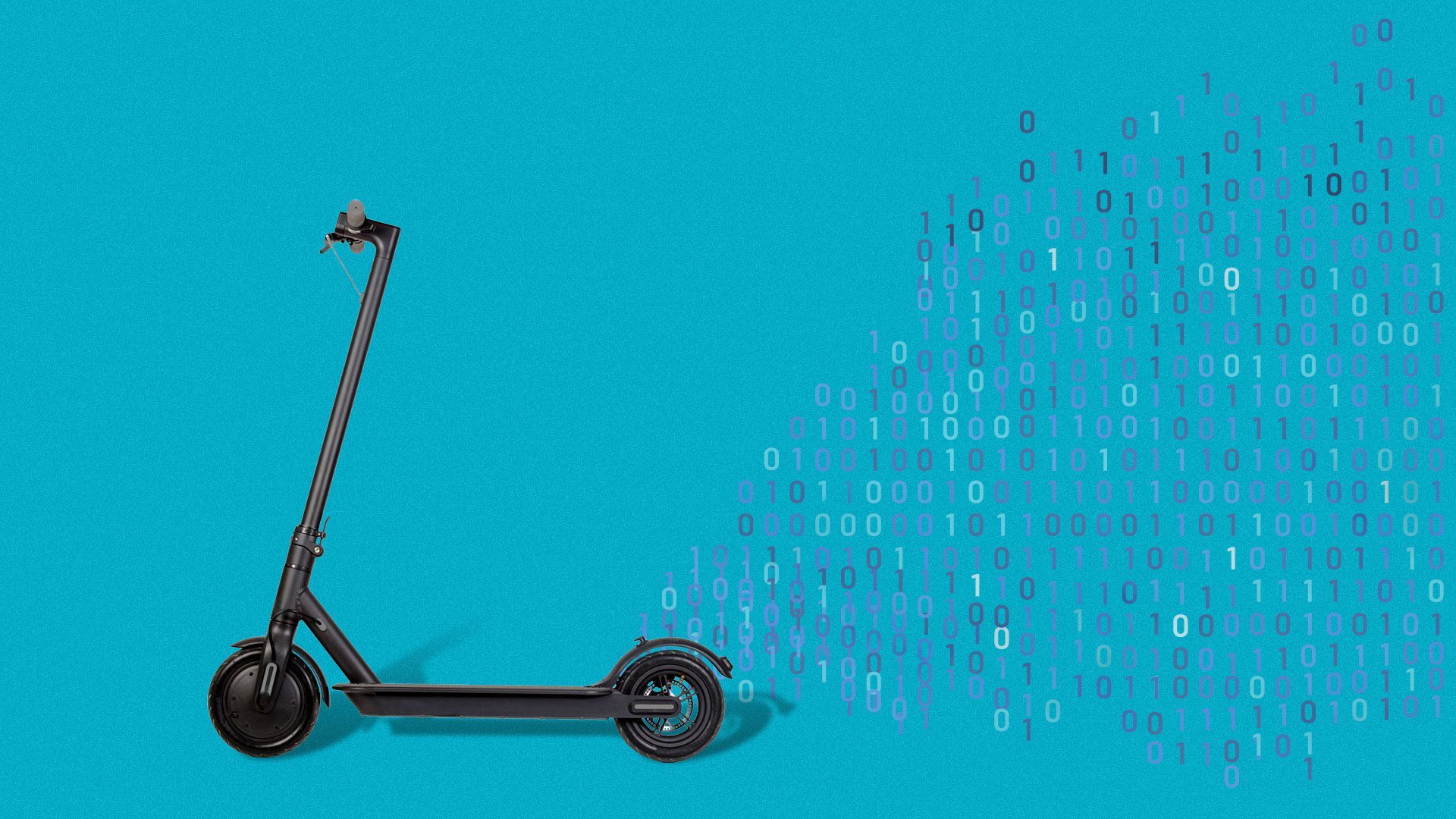| | | | | | | Presented By OurCrowd | | | | Axios Cities | | By Jennifer A. Kingson ·Nov 05, 2020 | | There are two five-letter surnames you won't find in Axios Cities today: One begins with a "T," and the other with a "B." - Today's newsletter is 1,380 words, which will take you 5 minutes to read. Get a friend to sign up for Axios Cities here!
| | | | | | 1 big thing: The great e-scooter debate |  | | | Illustration: Eniola Odetunde/Axios | | | | Fun, helpful and convenient, or dangerous eyesores for the young? Whichever side you take, shared e-scooters are coming in March to New York City — that is, to the four boroughs other than Manhattan. Why it matters: Ride-share purveyors have blanketed the nation with motorized scooters, a trend fueled by the coronavirus — as people shunned mass transit — and likely to continue unless safety or other problems intervene. (Remember hoverboards?) Driving the news: New York City, which TechCrunch called "one of the most coveted shared micromobility markets in the industry," just started soliciting interest in its upcoming pilot program. - This set off "a frenzy among dockless vehicle operators, who all see an opportunity to serve what has, until now, been the largest untapped market in the United States," per Smart Cities Dive.
- Bird, Lime, Spin and Voi are mentioned as contenders.
NYC is "angling for multiple vendors, but not having that be unwieldy," Phil Jones of Lime told me. "I think we've seen that in other cities in the first iteration with micromobility, where you're having 10-plus operators. That doesn't work well." - Maurice Henderson of Bird tells me his company is gung-ho about the market: "From a Bird perspective, if you can make it in New York, you can make it anywhere, right?"
- Manhattan is off the table for the moment — for all the obvious reasons, which e-scooter operators characterize primly as "having enough transportation options already." (Those options include Lyft's non-motorized shared Citi Bikes.)
The big picture: There are still a few other big U.S. cities up for grabs, either in pre-pilot or later stages — including Boston, Philadelphia, Houston and Chicago — and they are hoping to learn from the early adopters. - San Francisco banned e-scooters in 2018 after myriad problems, then reinstated them.
The bottom line: Safety remains a huge concern. - One study of people seeking ER treatment for e-scooter injuries found that sidewalks are particularly hazardous and that "e-scooter riders suffered injuries more frequently per mile traveled than bicyclists, but bicyclists were 3 times as likely as scooter riders to be hit by motor vehicles."
- Revel, which rents e-mopeds, suspended service in NYC this summer after three people were killed.
- Per the NYT: "Operation of the mopeds is not always immediately intuitive to those more familiar with cars and bikes, and 17 percent of Revel crashes in 2020 occurred on the user's first ride."
- Revel, which only rents to people who have driver's licenses, tells Axios it won't raise its hand for the citywide e-scooter program. An answering machine at its Brooklyn location says, "If you were involved in an accident, please press 2."
Share your thoughts on e-scooters? Love 'em? Hate 'em? I'm at jennifer@axios.com |     | | | | | | 2. Coronavirus puts huge strain on services for homeless |  | | | Illustration: Eniola Odetunde/Axios | | | | According to the National Alliance to End Homelessness, 71% of major cities are paying for hotel rooms for people in shelters and 86% report staffing shortages because of COVID-19. Why it matters: The pandemic has spurred some cities to action — buying up vacant hotels and apartments to house the homeless — and prompted bitter divisions in others as outdoor homeless encampments grow. - And a triple threat — the advent of cold weather, new spikes in coronavirus cases and the lifting of evictions moratoriums — is looming.
The backstory: Nobody knows whether the national homeless population is rising or falling in 2020, since the annual point-in-time count is conducted by HUD on a single night in January and thus doesn't capture what's happened during the pandemic. - But 81% of communities have seen an increase in the number of requests for help, per the National Alliance to End Homelessness.
- 64% of communities report a likely increase in unsheltered homelessness.
- The current situation differs vastly from one place to another.
Early in the pandemic, people feared that COVID-19 would travel rapidly through homeless populations. But that hasn't played out as feared, in part because communities have implemented the CDC's guidelines and moved people from shelters to hotels or other dwellings. - "The hotel industry has been hit really hard by the coronavirus — there's a lot of empty rooms — and in a lot of communities, hotel owners are making deals with city officials," Steve Berg, vice president of programs and policy for the National Alliance to End Homelessness, tells Axios.
Where it stands: Particularly in high-tourism cities, where hotel owners are saddled with rooms they can't fill, hoteliers are selling buildings outright to governments, which are using money from the CARES Act and other programs. - San Diego introduced Operation Shelter to Home in April, moving homeless people into the San Diego Convention Center to prevent the spread of COVID-19. About 900 people are being put into permanent housing through that program.
- In October, San Diego agreed to buy two former hotels to convert to affordable housing — with room for another 400 people.
- San Diego Mayor Kevin Faulconer told KUSI: "It's not enough to keep people off the street for a night or a week, but how do we get them into that place of their own for good."
The other side: Outdoor homeless encampments have been mushrooming — particularly in Western cities where they were already entrenched. - Los Angeles has agonized over outdoor homelessness, with the city council voting last week to postpone a contentious vote on encampment bans.
- In New York City, a battle over homeless men in single-room occupancy hotels on the Upper West Side turned ugly: A lawyer who represents people who want to move the men to a former Radisson hotel downtown had his home vandalized and the doors glued shut.
The bottom line: The dynamics will shift again this winter. - "There's a tidal wave of evictions coming at us, and it's going to produce some homelessness for sure," Linda Gibbs, a principal at Bloomberg Associates and former deputy mayor for health and human services in New York City, tells Axios.
- People are "tired of spending money on emergency interventions" rather than permanent solutions, she said.
|     | | | | | | 3. Apartment dwellers feel the pinch |  Reproduced from National Multifamily Housing Council; Chart: Axios Visuals Although August was the worst month in 2020 for apartment dwellers paying their rent on time, in full or in part — 92.1% — things haven't gotten much better since then. The big picture: "We have found a slight, but fairly steady, deterioration in rent payments," said Colin Dunn, a spokesperson for the National Multifamily Housing Council, which advocates for rent subsidies and extending evictions moratoria. - The group's online rent payment tracker shows what percentage of lessees of its more than 11 million units made payments in a given week.
- The Oct. 27 survey — the most recent — saw a payment rate of 94.6%, up from 92.2% in September.
The bottom line: Given the economic pain caused by the coronavirus, the payment rates are staying fairly strong, Dunn said. "Compared to where they could have been, we remain encouraged." |     | | | | | | A message from OurCrowd | | OurCrowd creates pre-IPO investment opportunities for you | | |  | | | | Today, OurCrowd members can invest in Cyabra. As disinformation becomes increasingly threatening to global brands, media and governments, Cyabra reports that it's uniquely positioned to serve this potential $6.1 billion market. Interested in investing? Join OurCrowd. | | | | | | 4. "Plumbing poverty" |  | | | Illustration: Annelise Capossela/Axios | | | | New Scientist ran an article this week with the headline, "Wealthy U.S. cities struggle to provide running water for all residents." The big picture: "Public information suggests that about half a million households in the U.S. — about 1.1 million people — live without piped water, which places them in 'plumbing poverty.'" - "Surveys also show that 73% of these households are found in metropolitan areas."
- An analysis found that San Francisco, Portland (Oregon) and Austin "are among the cities with the highest rates of plumbing poverty."
- "New York, Los Angeles and San Francisco — among the wealthiest U.S. cities — recorded the most overall residents without complete plumbing," the article said.
Why it matters: It's a wake-up call for Americans who thought that "no running water" referred only to rural places like Navajo Nation or disempowered urban ones like Flint, Michigan. |     | | | | | | 5. Worthy of your time |  | | | Illustration: Sarah Grillo/Axios | | | | If restaurants go, what happens to cities? (New York Times) - With the nation at risk of losing 85% of independent restaurants, cities may be forced to reexamine their roles as epicenters of glamour, conversation and cafe society.
Is innovation really making cities better? (City Monitor) - Prehistoric technology plagues many cities, as we all know too well: "Websites don't work on mobile phones, the public has to fill out forms with ballpoint pens on clipboards, and city staff are forced to re-enter data from one system to another. "
Building cities with wood would store half of cement industry's current carbon emissions (Science Daily) - This Finnish study describes the eye-catching green effects that sustainably grown wood sources could have in the construction industry.
First Dunkin' Donuts, Quincy, Mass. (Atlas Obscura) - I threw this in because it's fun — and it brought me back to the day I spent on this story about "Dunkin' Donuts University" in Braintree, Massachusetts (south of Quincy), where everyone who owned or managed a franchise had to learn to make the donuts. Now it's called Dunkin' Brands University and also teaches Baskin-Robbins franchisees.
|     | | | | | | A message from OurCrowd | | VC in on successful IPOs of 2019 and 2020 launches pandemic fund | | |  | | | | OurCrowd's Pandemic Innovation Fund. The idea: From communication companies adapting to the new normal to med-tech to food security solutions, the fund's investments have potential for positive impact and superior returns. If you're interested in investing, you need to join OurCrowd. | | | | Suggestions? Corrections? Additions? Omissions? I'm listening: jennifer@axios.com | | | | Axios thanks our partners for supporting our newsletters.
Sponsorship has no influence on editorial content. Axios, 3100 Clarendon Blvd, Suite 1300, Arlington VA 22201 | | | You received this email because you signed up for newsletters from Axios.
Change your preferences or unsubscribe here. | | | Was this email forwarded to you?
Sign up now to get Axios in your inbox. | | | | Follow Axios on social media:    | | | | | |








No comments:
Post a Comment